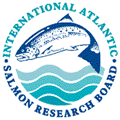SMOLTrack IV

Recent marine survival estimates are amongst the lowest recorded in decades and indicate that as little as 3% of wild smolts now survive to return as adults. In recent decades, survival at sea has generally been accepted as the key determinant of river stock abundance. However, recent research conducted in Denmark, England, Ireland, Spain, Sweden and Northern Ireland through the EC-funded SMOLTRACK and related initiatives, have indicated that smolt mortality during the early outward migratory phase from ‘source to sea’ is greater than previously assumed. In addition, various studies have demonstrated that a reduction in negative pressures (e.g. predation, aquaculture) on smolts in this zone of influence can ultimately boost associated number of adult returns. Therefore, it has become apparent that significant knowledge gaps remain to comprehensively understand, quantify and partition the principal cumulative factors responsible for Atlantic salmon smolt survival during this critical life stage. However, there is obviously a large mortality in the oceanic phase of Atlantic salmon. The studies into causes and consequences have primarily been done by modelling because detailed information about salmon behaviour and migration routes in the Ocean is scarce. Classic expeditions by ship is prohibitively expensive and furthermore restricted both in time and space and are also to some extent catch-per-unit effort limited. Telemetry has proven to be the only viable method to get detailed knowledge of this behaviour.
In recent years a few studies using satellite tags have been published, giving information on salmon migration at sea. Unfortunately, the current PSAT tags are too large to deploy on smaller fish (i.e. smolts), hence the preferred animals to tag are large kelts and the PSATs are typically limited to a 12 month deployment. Hence, there is still a lack of behavioural data, especially for the smaller life stages, and there is a limitation in data describing the return migration from the feeding grounds in the Northern Atlantic.
Acquiring detailed information from salmon behaviour at sea is a challenge and will require a multifaceted approach. The project aims to investigate the post-smolt behaviour during migration from coastal areas to the feeding grounds in the north Atlantic. Additionally, the project aims to identify and evaluate the potential for “fit for purpose tagging” (FFPT) in the North Atlantic, using insight gained from pilot studies undertaken in previous SMOLTRACK projects. Identifying ways to obtain detailed knowledge on coastal and ocean behaviour and migration will be a pre-requisite for a greater understanding of the factors governing behaviour and ocean survival for Atlantic salmon and can feed directly into fisheries management strategies that may optimise and naturally enhance the probability of wild adult returns.
To address these issues, the following work packages (WP) will comprise the project:
- WP1 OceanTemp-smolt
- WP2 FFPT-adult
The following EU jurisdictions will participate in the project:
- Denmark
- Finland
- Ireland
- Portugal
- Sweden
- Spain
The following areas outside EU will participate in the project:
- England
- Northern Ireland
The existing SMOLTRACK partnership, which has been operating since 2017, together with its new partners, has extensive experience in migratory fish research and particularly telemetry studies, often using their existing telemetry arrays. The distribution of experienced project partners, across the wide latitudinal distribution of salmon in Europe, will allow the project to investigate salmon under varying climatic ranges. It ensures a fast and wide international uptake of the results produced by the studies. Value for money (VFM) is assured through considerable partner agency in-kind staff time to undertake the project. SMOLTRACK I, II and III have already produced important research outputs (peer reviewed papers) and we aim to further advance understanding through SMOLTRACK IV.
More information on the SMOLTrack Projects can be found at https://www.smoltrack.eu/
